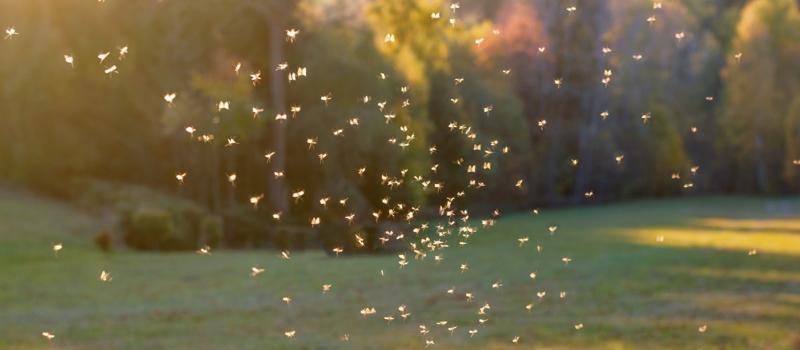When Is Mosquito Season?
Posted by Mosquito Squad
September 5, 2023

If you think mosquitoes are done for the year… think again! As we ease out of summer into fall, mosquitoes across the U.S. are still out and about, biting their time. But what factors influence mosquitoes to be active? And with longer seasons and unusual weather patterns, is “mosquito season” still a thing? To answer these, let's first cover what kinds of consistent weather mosquitoes need.
What Do Mosquitoes Need to Thrive?
Like other insects, mosquitoes need a few basic conditions to survive and reproduce.
First, mosquitoes require moisture in the air and on the ground. In environments that lack water in the air (think dry, arid regions like deserts or well-circulated buildings with moisture control), mosquitoes are susceptible to drying out and dying from, essentially, dehydration. Moisture also refers to the standing, stagnant water mosquitoes need to lay their eggs. Mosquitoes are semi-aquatic insects, and the first half of their lifecycle through egg, larva, and pupa takes place entirely underwater. Without a standing body of water present, adult mosquitoes cannot lay their eggs and continue to reproduce.
Second, mosquitoes require warm environments. Insects are cold-blooded, meaning they cannot control their body temperatures. When insects get cold, they have to physically move to warmer areas, overwinter, or die. Mosquitoes are most active when temperatures are 80°F (20°C) and least active when temperatures are 50°F (10°C) or below.
Put heat and precipitation together, and it seems that mosquito season would occur during the parts of the year that are warm and wet. So, mosquito activity is limited to spring through summer months… right? This may be the case in a typical year, but atypical weather patterns from season to season significantly influence mosquito populations.
How Does Unseasonal Weather Change Mosquito Pressure?
When we think about the four seasons, spring, summer, fall, and winter, we usually associate strict weather conditions with each. Spring is a time when snow is thawing, and rainstorms are bringing back fresh foliage. Summers are warm and keep getting warmer as the year progresses. Fall air turns brisk as leaves change color and crops drop their last harvest. Winter is cold, so cold that most animals migrate, hibernate, or die from the frost. While this calendar paints a lovely picture of 365 days of weather, mosquitoes don’t care about the month or the season. So long as it’s warm and wet, mosquitoes will be present.
Furthermore, many events occur throughout the year that put a wrench in the expected seasonal climates. Hurricane season, for instance, runs from June through November, bringing with it intense rain events, flash flooding, and warm winds. For regions of the U.S. near the Gulf Coast and surrounding states, hurricane season eliminates the fall season, extending the warm weather patterns of summer longer than sometimes expected.
Another unseasonal weather trend the U.S. is experiencing this year is the El Niño climate pattern. El Niño is a complex climate event that happens every two to seven years, where surface temperatures in the central and eastern equatorial Pacific Ocean warm. This "warm phase" alters the temperature of sea waters, the speed and strength of ocean currents, and local weather trends across the globe. For the U.S., this phenomenon creates dryer and warmer climates in the north through Canada and wetter periods with amplified storms throughout the Gulf Coast. These trends also extend the climate conditions mosquitoes need to thrive.
Call Mosquito Squad Today!
Even when the weather is unpredictable, rest assured Mosquito Squad has your back. Our traditional and natural barrier treatments help protect your yard from mosquitoes, regardless of the season. Call the pros at Mosquito Squad today at (512) 488-5331 or get a free quote.
